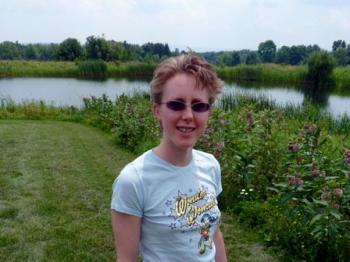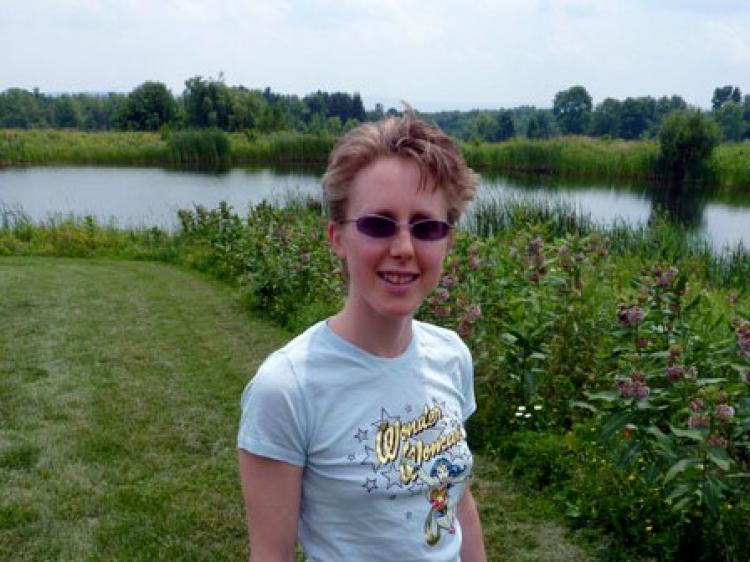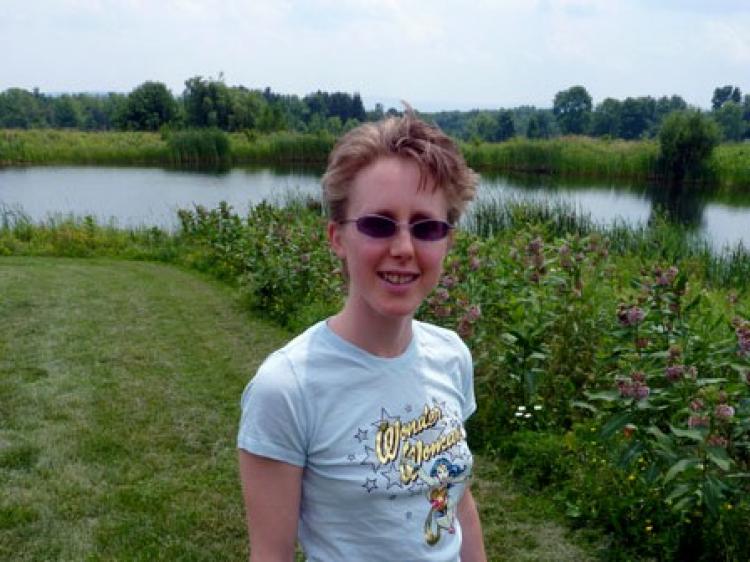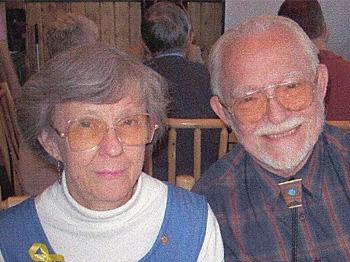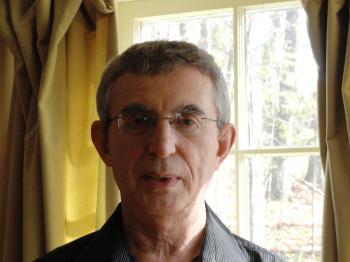Sarah Amberge, 30, the middle child of three sisters, was born in Ithaca, Tompkins County, NY, on Connecticut Hill, where a good portion of the hill belonged to her ancestors.
Amberge works at the Advocacy Center, a center for people who have experienced domestic and/or sexual violence.
“I work with victims of violence: I am there for them,” Sarah says. “Our systems in society sometimes can further hurt the victims even though their ostensible purpose is to help the people who turn to them distraught--in pain and suffering.
“I put myself in my client’s shoe. I am there for them; that what happened to them is wrong, and that it is not their fault—many systems blame the victim, which infuriates me. I try to minimize that as much as possible.”
Sarah, herself, having been home-schooled, was isolated out of choice. She loves books. Books have shaped her to make her the special person she is.
For example, she learned from Marion Zimmer Bradley’s books: “To be a strong woman; to learn to love enemies, to know that violence is wrong, and to care for others.” She seems to have given her a matriarchal approach to solutions in life and at work.
How did young Sarah get to do the work that most suits her?
Her father’s family owned most of Connecticut Hill. They were an old family from the time of the Civil War. As it happens everywhere, people whose primary asset is land, ultimately end up with smaller estates. Sarah’s paternal grandfather owned just 250 acres of Connecticut Hill.
The family had respect, not the cash flow from business or farming; but even during their moneyless years they had food from their orchards. “We had apples from trees that were over a hundred years old; we made apple cider at the cider press; we had cherries, and wild berries including strawberries,” she says.
If you see pictures of Connecticut Hill, you can see how gorgeous the place is—with waterfalls, natural landscapes, and foliage—a feast for the eyes. Recently Sarah’s father sold 200 plus acres of his own land to a wind farm owner.
Sarah’s grandmother, Hilda, started working as a school librarian to augment the family income. For Sarah, it was thrilling to have a grandmother who worked as the school librarian.
She says, “I could borrow books from the public library; the limit was 25 books, but around 10 years of age or so, that went up to 50, which was really exciting for me. I remember I contracted the chicken pox when I was 12 years old and I read all day while I was sick I read 14 books in one day.”
Sarah had an Irish Setter, Sasha, and when Sasha died of cancer, she was able to tell herself that death was a natural passage; but when her second dog, Tara, also died of cancer, she lost her faith. Her parents were Southern Baptists, but Sarah thought that Sasha’s death was an affront. She stoppped being a Baptist.
When she turned nine, Sarah’s parents told her that she could keep a horse to ride in the woods. It was a wonderful turn in her life.
She was to take care of her horse and not burden the family in any way. She rode in the woods and fed and groomed her horses.
She had not only one horse, but two, a mother and her foal. The mother died, but the daughter, is still alive, though old; she is now out to pasture and is only ridden once or twice a year.
There was no need to ask Sarah what she thought of EcoVilage; it is obvious as we watch her each day: leading tour groups visiting the village, helping with washing dishes after the Common House meals, car sharing, and most of all composting.
She says, “I really was conscious of my choices and how what we do affects the environment. I struggled living downtown in Ithaca to do some things like composting. It is so much easier in EcoVillage. As a group, we achieve so much more than I can as an individual.”
Amberge works at the Advocacy Center, a center for people who have experienced domestic and/or sexual violence.
“I work with victims of violence: I am there for them,” Sarah says. “Our systems in society sometimes can further hurt the victims even though their ostensible purpose is to help the people who turn to them distraught--in pain and suffering.
“I put myself in my client’s shoe. I am there for them; that what happened to them is wrong, and that it is not their fault—many systems blame the victim, which infuriates me. I try to minimize that as much as possible.”
Sarah, herself, having been home-schooled, was isolated out of choice. She loves books. Books have shaped her to make her the special person she is.
For example, she learned from Marion Zimmer Bradley’s books: “To be a strong woman; to learn to love enemies, to know that violence is wrong, and to care for others.” She seems to have given her a matriarchal approach to solutions in life and at work.
How did young Sarah get to do the work that most suits her?
Her father’s family owned most of Connecticut Hill. They were an old family from the time of the Civil War. As it happens everywhere, people whose primary asset is land, ultimately end up with smaller estates. Sarah’s paternal grandfather owned just 250 acres of Connecticut Hill.
The family had respect, not the cash flow from business or farming; but even during their moneyless years they had food from their orchards. “We had apples from trees that were over a hundred years old; we made apple cider at the cider press; we had cherries, and wild berries including strawberries,” she says.
If you see pictures of Connecticut Hill, you can see how gorgeous the place is—with waterfalls, natural landscapes, and foliage—a feast for the eyes. Recently Sarah’s father sold 200 plus acres of his own land to a wind farm owner.
Sarah’s grandmother, Hilda, started working as a school librarian to augment the family income. For Sarah, it was thrilling to have a grandmother who worked as the school librarian.
She says, “I could borrow books from the public library; the limit was 25 books, but around 10 years of age or so, that went up to 50, which was really exciting for me. I remember I contracted the chicken pox when I was 12 years old and I read all day while I was sick I read 14 books in one day.”
Sarah had an Irish Setter, Sasha, and when Sasha died of cancer, she was able to tell herself that death was a natural passage; but when her second dog, Tara, also died of cancer, she lost her faith. Her parents were Southern Baptists, but Sarah thought that Sasha’s death was an affront. She stoppped being a Baptist.
When she turned nine, Sarah’s parents told her that she could keep a horse to ride in the woods. It was a wonderful turn in her life.
She was to take care of her horse and not burden the family in any way. She rode in the woods and fed and groomed her horses.
She had not only one horse, but two, a mother and her foal. The mother died, but the daughter, is still alive, though old; she is now out to pasture and is only ridden once or twice a year.
There was no need to ask Sarah what she thought of EcoVilage; it is obvious as we watch her each day: leading tour groups visiting the village, helping with washing dishes after the Common House meals, car sharing, and most of all composting.
She says, “I really was conscious of my choices and how what we do affects the environment. I struggled living downtown in Ithaca to do some things like composting. It is so much easier in EcoVillage. As a group, we achieve so much more than I can as an individual.”

